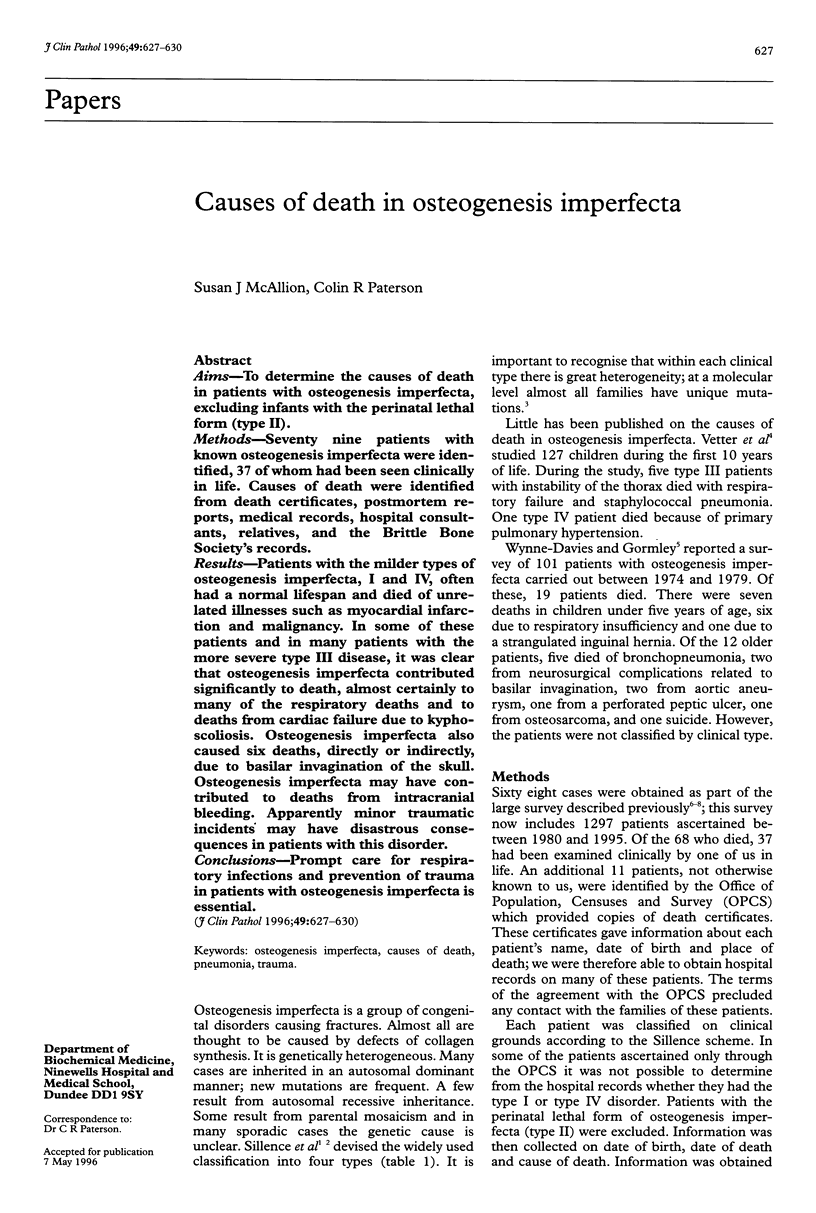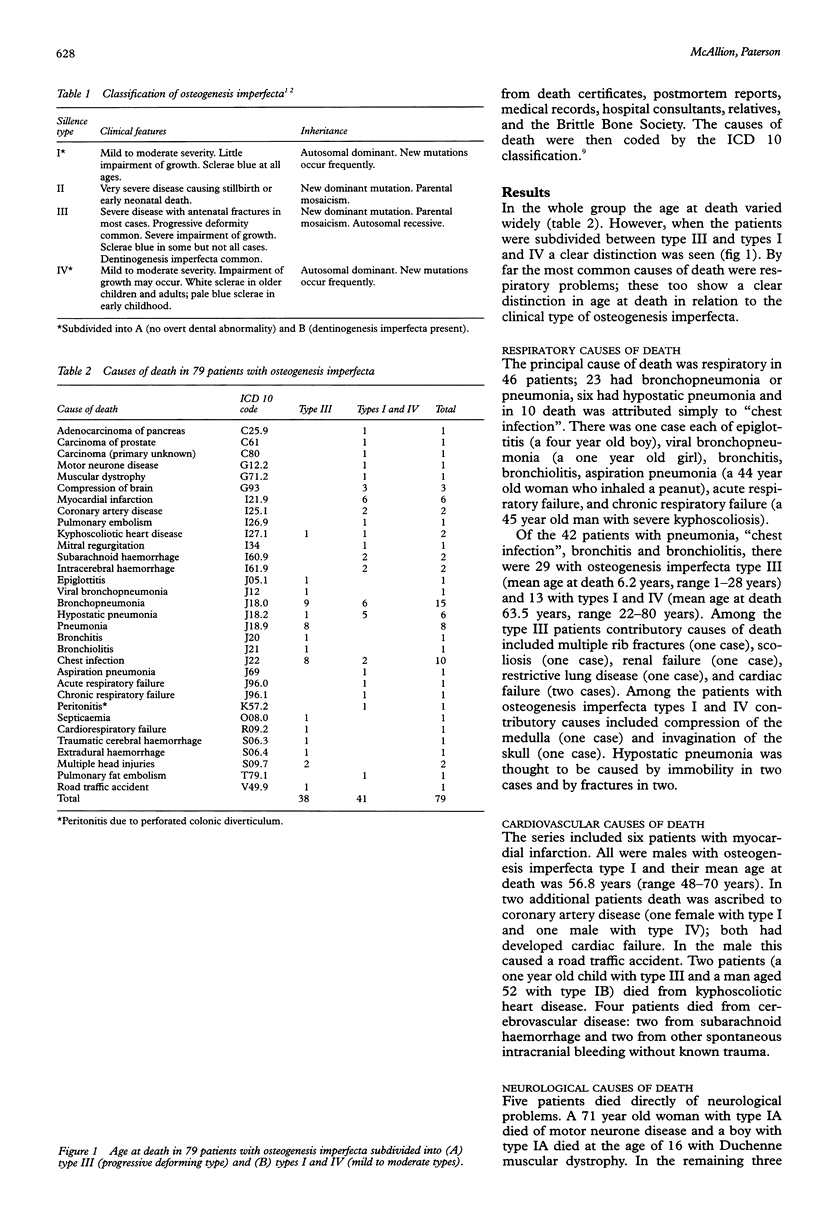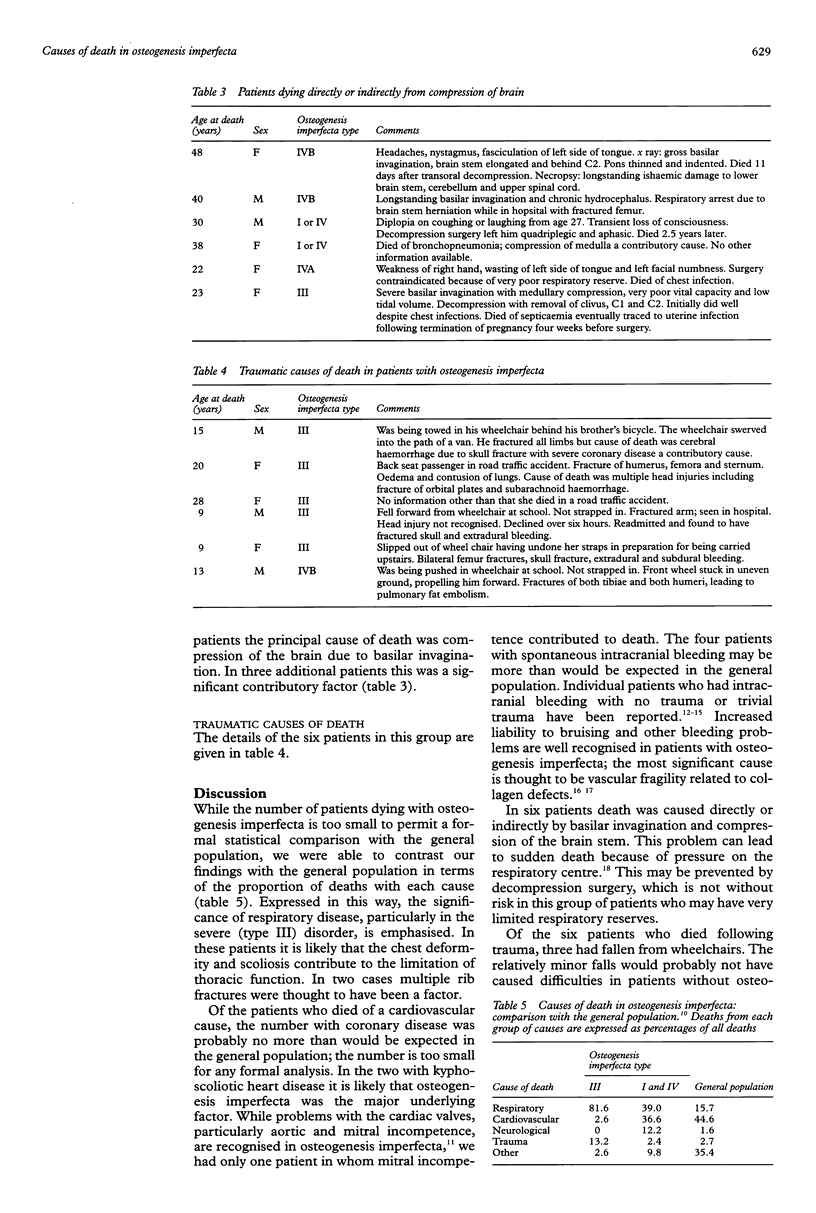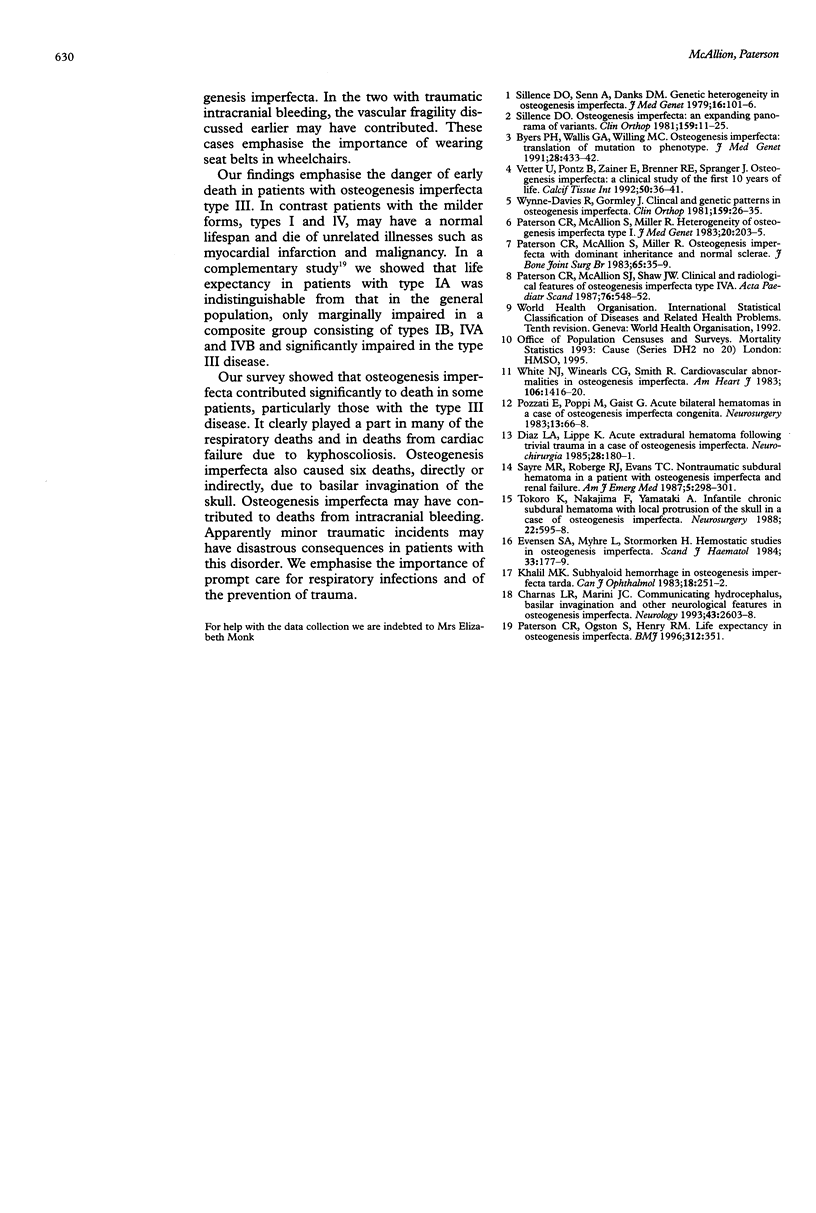Abstract
AIMS: To determine the causes of death in patients with osteogenesis imperfecta, excluding infants with the perinatal lethal form (type II). METHODS: Seventy nine patients with known osteogenesis imperfecta were identified, 37 of whom had been seen clinically in life. Causes of death were identified from death certificates, postmortem reports, medical records, hospital consultants, relatives, and the Brittle Bone Society's records. RESULTS: Patients with the milder types of osteogenesis imperfecta, I and IV, often had a normal lifespan and died of unrelated illnesses such as myocardial infarction and malignancy. In some of these patients and in many patients with the more severe type III disease, it was clear that osteogenesis imperfecta contributed significantly to death, almost certainly to many of the respiratory deaths and to deaths from cardiac failure due to kyphoscoliosis. Osteogenesis imperfecta also caused six deaths, directly or indirectly, due to basilar invagination of the skull. Osteogenesis imperfecta may have contributed to deaths from intracranial bleeding. Apparently minor traumatic incidents may have disastrous consequences in patients with this disorder. CONCLUSIONS: Prompt care for respiratory infections and prevention of trauma in patients with osteogenesis imperfecta is essential.
Full text
PDF



Images in this article
Selected References
These references are in PubMed. This may not be the complete list of references from this article.
- Byers P. H., Wallis G. A., Willing M. C. Osteogenesis imperfecta: translation of mutation to phenotype. J Med Genet. 1991 Jul;28(7):433–442. doi: 10.1136/jmg.28.7.433. [DOI] [PMC free article] [PubMed] [Google Scholar]
- Charnas L. R., Marini J. C. Communicating hydrocephalus, basilar invagination, and other neurologic features in osteogenesis imperfecta. Neurology. 1993 Dec;43(12):2603–2608. doi: 10.1212/wnl.43.12.2603. [DOI] [PubMed] [Google Scholar]
- Diaz L. A., Lippe K. Acute extradural haematoma following trivial trauma in a case of osteogenesis imperfecta. Neurochirurgia (Stuttg) 1985 Jul;28(4):180–181. doi: 10.1055/s-2008-1054194. [DOI] [PubMed] [Google Scholar]
- Evensen S. A., Myhre L., Stormorken H. Haemostatic studies in osteogenesis imperfecta. Scand J Haematol. 1984 Aug;33(2):177–179. doi: 10.1111/j.1600-0609.1984.tb02393.x. [DOI] [PubMed] [Google Scholar]
- Khalil M. K. Subhyaloid hemorrhage in osteogenesis imperfecta tarda. Can J Ophthalmol. 1983 Aug;18(5):251–252. [PubMed] [Google Scholar]
- Paterson C. R., McAllion S. J., Shaw J. W. Clinical and radiological features of osteogenesis imperfecta type IVA. Acta Paediatr Scand. 1987 Jul;76(4):548–552. doi: 10.1111/j.1651-2227.1987.tb10519.x. [DOI] [PubMed] [Google Scholar]
- Paterson C. R., McAllion S., Miller R. Heterogeneity of osteogenesis imperfecta type I. J Med Genet. 1983 Jun;20(3):203–205. doi: 10.1136/jmg.20.3.203. [DOI] [PMC free article] [PubMed] [Google Scholar]
- Pozzati E., Poppi M., Gaist G. Acute bilateral extradural hematomas in a case of osteogenesis imperfecta congenita. Neurosurgery. 1983 Jul;13(1):66–68. doi: 10.1227/00006123-198307000-00014. [DOI] [PubMed] [Google Scholar]
- Sayre M. R., Roberge R. J., Evans T. C. Nontraumatic subdural hematoma in a patient with osteogenesis imperfecta and renal failure. Am J Emerg Med. 1987 Jul;5(4):298–301. doi: 10.1016/0735-6757(87)90355-x. [DOI] [PubMed] [Google Scholar]
- Sillence D. O., Senn A., Danks D. M. Genetic heterogeneity in osteogenesis imperfecta. J Med Genet. 1979 Apr;16(2):101–116. doi: 10.1136/jmg.16.2.101. [DOI] [PMC free article] [PubMed] [Google Scholar]
- Sillence D. Osteogenesis imperfecta: an expanding panorama of variants. Clin Orthop Relat Res. 1981 Sep;(159):11–25. [PubMed] [Google Scholar]
- Tokoro K., Nakajima F., Yamataki A. Infantile chronic subdural hematoma with local protrusion of the skull in a case of osteogenesis imperfecta. Neurosurgery. 1988 Mar;22(3):595–598. doi: 10.1227/00006123-198803000-00029. [DOI] [PubMed] [Google Scholar]
- Vetter U., Pontz B., Zauner E., Brenner R. E., Spranger J. Osteogenesis imperfecta: a clinical study of the first ten years of life. Calcif Tissue Int. 1992 Jan;50(1):36–41. doi: 10.1007/BF00297295. [DOI] [PubMed] [Google Scholar]
- White N. J., Winearls C. G., Smith R. Cardiovascular abnormalities in osteogenesis imperfecta. Am Heart J. 1983 Dec;106(6):1416–1420. doi: 10.1016/0002-8703(83)90055-8. [DOI] [PubMed] [Google Scholar]
- Wynne-Davies R., Gormley J. Clinical and genetic patterns in osteogenesis imperfecta. Clin Orthop Relat Res. 1981 Sep;(159):26–35. [PubMed] [Google Scholar]



